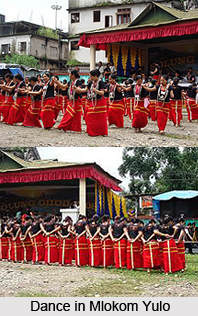 Mlokom Yulo is one of the major festivals of India in North East India. This festival is one of the major festivals of Bangnis.
Mlokom Yulo is one of the major festivals of India in North East India. This festival is one of the major festivals of Bangnis.
Mlokom Yulo is the only festival which is celebrated annually in every village on a community basis in the Bangini months of Lakhang and Leehar corresponding to the English month of March and April.
Occasion of Mlokom Yulo
Mlokom Yulo is celebrated for five days, but occasionally the period may extend to seven days depending on the result of divination performed prior to the fixation of the date of celebration. The divination is done by a local priest (Nibu) by examining the liver of a foul and the yolk of an egg respectively.
Place of the Mlokom Yulo
The place where the festival is celebrated is called Mlkom-Yulo-Nyengeng. They do not have a permanent festival place. On the previous day of the festival, the villagers keep themselves busy in collecting rice beer, rice making rice powder, egg and silk cloth. Sacrificial animals such as mithun, cow, pig, goat and fowl are usually purchased either from their common village fund or by collecting money or paddy from each house hold.
Divine Offerings to Mlokom Yulo
Mlokom Yulo is started with worship in the name of god-Doni-Yulo where rice beer, rice powder and white cock are offered. Another God called Kamio-Yulo is also worshipped in the same place by offering only rice beer. When the prayers are over, the white cock is brought down to examine its liver with a view to knowing the omen of the festival. Different worships are performed on different days in the name of different gods and goddess by offering and sacrificing different animals in accordance with the result of divination. At the end of the festival, the villagers observe taboo for five days during which period they do not go out of the village. The observance of taboo is known as Mlkom-Arina. The people of all areas both local and other including tribals and non tribals irrespective of caste clan and creed uniformly participate in the Mlokom Julo festival.



















